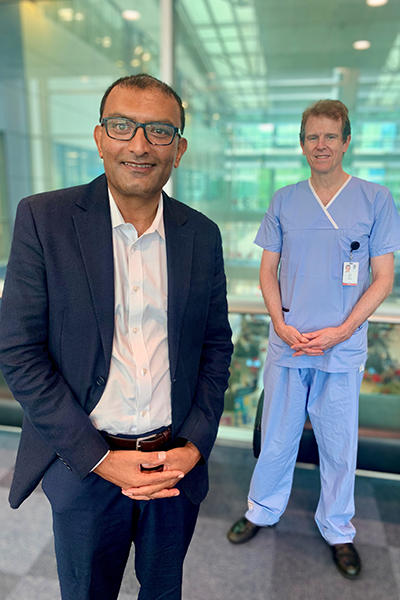Redefining risk for heart attack patients
Research at the Royal Brisbane and Women’s Hospital is looking into the role of advanced echocardiography in myocardial infarction (heart attack) patients and how it can be used to evaluate the risk of adverse outcomes in the future. Through identifying patients most at risk, preventative treatment can be provided – helping patients live longer, healthier lives.

Associate Professor Sandhir Prasad and RBWH Director of Cardiology John Atherton are using data to help predict heart attack risk more accurately
Around one in twenty Australians will experience a heart attack in their lifetime. Predictors show that once a patient has had one heart attack, they are at a higher risk of having further heart attacks in the future with potentially fatal consequences. At present, simple tools are used to assess the risk of a patient experiencing adverse events in the future, however researchers at the Royal Brisbane and Women’s Hospital (RBWH) have identified an opportunity to use advanced echocardiography measurements to predict risk more accurately.
Echocardiography is an ultrasound of the heart which provides a range of data and measurements. At present, only one measurement – the measurement of heart strength or ‘ejection fraction’ – is typically used by clinicians to predict risk. Studies show that most people who die suddenly of heart attacks don’t necessarily have a severely reduced ejection fraction, suggesting therefore that other measurements available from the ultrasound should also be taken into account so clinicians can more accurately identify high risk patients.
The ECHO Guide Study (Echocardiography Guided Prognosis Following Myocardial Infarction: Redefining Risk Stratification to Improve Patient Outcomes) will focus on applying a new scoring system to data provided in echocardiography ultrasounds to predict future risk, so treating teams can identify the patients in most urgent need of further treatment and intervention.
The world-first novel scoring system will use retrospective data of heart attack patients at RBWH over the past decade to assess risk and compare it with the current method of prediction to assess if it is more accurate.
Principal Investigator and RBWH Echocardiography Clinical Lead Associate Professor Sandhir Prasad said that should the study be successful at identifying high risk patients, they will be able develop individualised prevention strategies for these people rather than using a one-size-fits all treatment approach.
“We have recently joined the National Echo Database of Australia (NEDA) which means we will be able to access their extensive data and advanced statistical analysis capabilities for our research,” Associate Professor Prasad said.
“We hope that through earlier detection, we can hit these patients with everything we’ve got to prevent future adverse outcomes.
“Through treatments and techniques such as implantable defibrillators, medication, cardiac rehabilitation and lifestyle changes, we believe we can prevent many future adverse events.”
